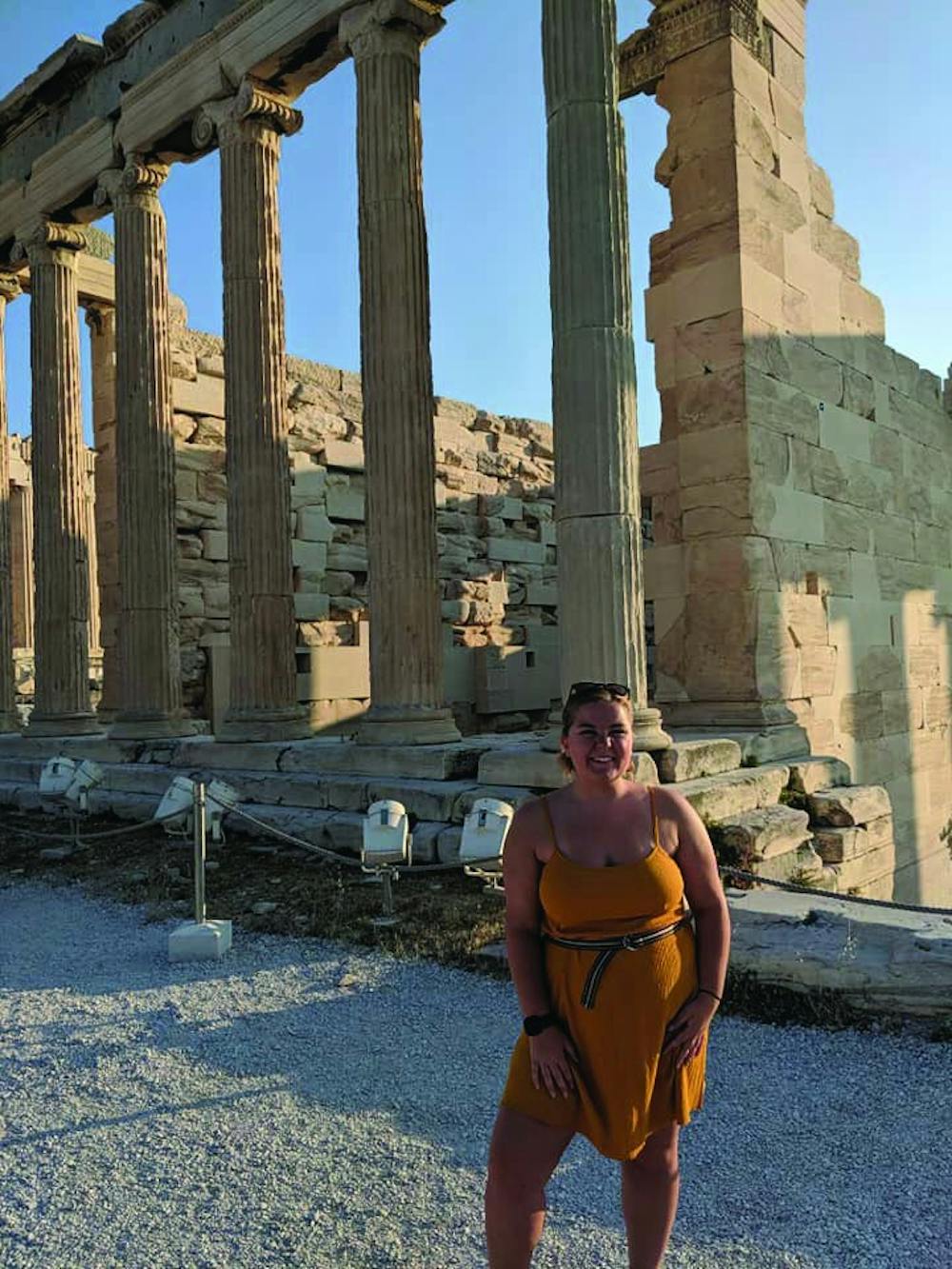Why is the sea water around Greece so blue?
- In deeper water, sunlight doesn’t reflect off the seafloor, so a majority of the sun’s rays are absorbed by the water itself.
- Microorganisms in the water also absorb light. Because the Mediterranean Sea is landlocked and has limited tides, there isn’t much water exchange. Because of this, there isn’t enough nutrients in the water for phytoplankton, which are microscopic marine algae that make the water color green, to survive. So, the water stays a clear, deep blue color.
Sources: Encyclopedia Britannica, Mental Floss
Editor's note: Miles from Muncie is a Ball State Daily News series profiling Ball State students and their study abroad programs. If you have any suggestions as to who we should feature next, send an email to features@bsudailynews.com.
“I couldn’t believe I jumped off the boat.”
While studying abroad in Greece, Haley Elgin, junior marketing major, said she had several moments where she thought to herself, “I can't believe I'm here doing this,” especially when she was cliff diving at Sarakiniko Beach, climbing an active volcano in Santorini and diving off a boat to swim in volcanic hot springs.
“After we climbed the volcano, they took our boat down probably a mile, and they threw down the anchor, and they said, ‘Jump,’” Elgin said. “So, I just jumped off this boat — no life jacket or anything because you float in that sea. The Aegean Sea is so salty that you just float.”
Elgin was one of 24 students who explored 10 different cities and island during a six-week study abroad trip through the Kentucky Institute for International Studies.
As Elgin prepared for her trip abroad, she said she was mainly worried about transferring her money to Euros and making sure she had a way to contact people because her cell phone provider didn’t work abroad.
“Ultimately, what I did was I went to a Greek cell phone provider and bought a plan from them,” Elgin said. “All of the contracts were in Greek, and I had no clue what I was signing up for. So eventually, I was able to get money and get a phone. Once I had those things that I kind of consider essential, I was a lot less anxious.”
Kayla Trowbridge, sophomore French, political science and public relations major, said as she looked at her orientation’s packing list for Greece, she wouldn’t have thought to bring a long skirt to wear to Hosios Loukas, a monastery her program would visit.
“[Hosios Loukas] was up on this mountain, and you were completely isolated from everything else,” Trowbridge said. “You could look down from the pavilion, and you could see it was just mountains and greenery for miles. There was nothing else around.”
As Elgin and Trowbridge traveled to Mykonos, Milos, Athens, Delphi, Delos, Olympia, Santorini and Naxos, they visited the archaeological museums, including the Acropolis Museum, and historical sites, such as ancient Olympia and the Catacombs of Milos.
“It was really kind of humbling because those were the oldest things I'd ever seen,” Elgin said. “In the U.S., our history is really pretty new. [In Greece] you're looking at stuff that they say is seventh century B.C., and we don't have that here. It put time into perspective for me.”
As their study abroad program traveled across Greece by bus or ferry, both Elgin and Trowbridge said their surroundings, especially in Mykonos, looked like a scene from the movie, “Mamma Mia!”
“[Mykonos] was very much what you imagine in your head,” Elgin said. “They had really committed to the white buildings, blue door — the sidewalks were cobblestone. It's an island, so you are surrounded by the beautiful Greek water, which is insanely blue.”
From interacting with Greek locals, Trowbridge said she felt Greece had a friendly and welcoming culture as they would greet her and other students every time they saw them.
“I feel like if you ask me questions about Muncie, I really couldn’t tell you anything,” Trowbridge said. “We would go and ask [Greek locals,] 'Where should we go around here for this?' or 'How do I get here?' And they knew a lot about it. They would be able to tell you a little bit of history behind it. I feel like a lot of them, they have a deeper connection to Greece than I do to the U.S.”
While studying abroad, some of the Greek dishes Trowbridge and Elgin tried were pestitsio, a Greek pasta bake; Loukoumades, fried dough covered in honey and walnuts; gyros and chickpea soup only served on Sundays. But, there were American foods Trowbridge and Elgin were homesick by the end of their six-week program.
“There's no ranch dressing in Greece anywhere,” Elgin said. “Throughout Greece, they also don't really have a great water system like to drink water … I think I was really homesick for refills because you had to ration [your water] out, and you couldn't just keep drinking because [the servers] weren't going to bring over another one unless you wanted to pay for it.”
While eating and traveling throughout Greece, Trowbridge and Elgin took courses in travel writing and mythology, which Trowbrigdge said is what first drew her to the study abroad program.
“I love stories,” Trowbridge said. “I really like writing, and I've always been a big reader, so anything story related really just gets me.”
Trowbridge said the overarching theme of her travel guide for their travel writing class was viewing Greece through the eyes of Romantic-era poets.
“One thing I wrote about was … the Temple of Demeter,” Trowbridge said. “The Parthenon I would say is one of the most well-known temples. It’s very grand, very impressive, but [the Temple of Demeter is] sort of where you got the sense that these were Gods that were really close to the people, and Gods you felt connected to. So, I wrote about that and the sense of intimacy with nature and with religion you that you got there.”
Elgin said one topic her traveling writing class talked about as she wrote her travel guide was how women are treated differently in Greek culture.
“Being blonde isn’t very common — people are catcalled a lot because of that,” Elgin said. “When we were in Naxos, there was a diner that was a hub for these old men … As a blonde, I was hollered at, and it made me uncomfortable. So those are things that [my professor] taught us to prepare other visitors for because I made my guide for college women who were planning to go.”
At the end of each day of traveling, Elgin and Trowbridge would return to their hotel rooms where they would write for their mythology class, tying in the Greek myths they learned from their professors with the sites they saw in Greece that day.
Trowbridge said after an overwhelming day, she was grateful to spend time with people who knew how she felt.
“It was nice to relate to someone all the time because when I studied abroad in Ireland [during my junior year of high school,] I was the only American student there," Trowbridge said. "So, a lot of the times it felt very much like, “I’ve got to figure this out myself,’ and that wasn’t really the vibe here."
Once she returned home, Elgin said, she felt the program had expanded her worldview beyond her small hometown in Campbellsburg, Indiana.
“I think that this program sort of gave me a new perspective on how other people live,” Elgin said. “I think that will help me because I'll be able to better communicate with people who are different from me. If I work for a large company, it's pretty likely that I'll be talking to people who aren’t from the U.S. The experience taught me patience and how to better interact with people.”
Trowbridge said not only has her study abroad trip reaffirmed that she wants to travel more in her future, but it also helped her grow her confidence.
“I had a really rough freshman year, and so getting to go on this trip and making a lot of friends and getting to know people, it really helped build my confidence,” Trowbridge said. “All my friends told me when I came back, ‘You seem much more sure of yourself.’ I got to know myself a lot better... and I just became a person I really liked.”
Contact Nicole Thomas with comments nrthomas3@bsu.edu or on Twitter @nicolerthomas22.





